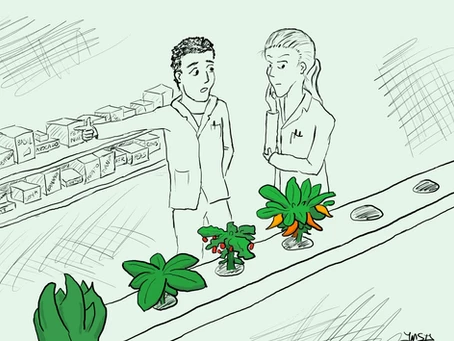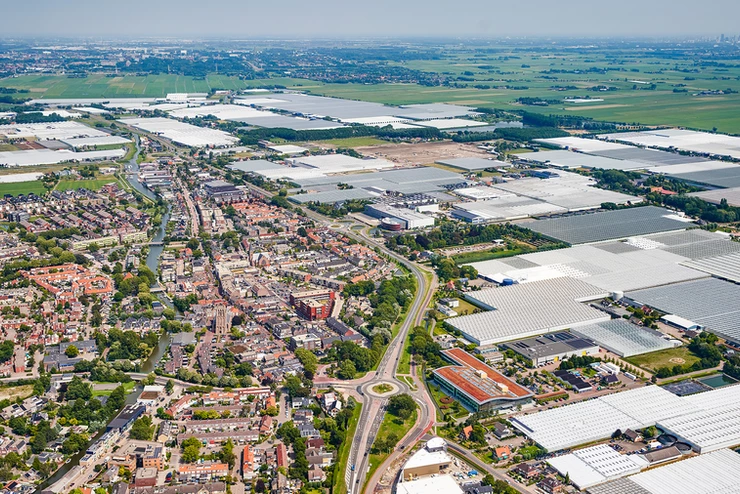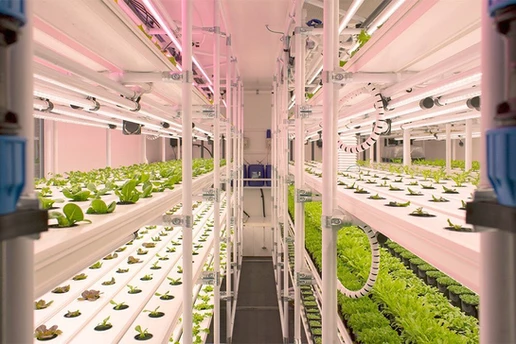Building a Sustainable Future: The Case for Urban AgriTech Benchmarking in the UK
As the world faces growing environmental challenges—climate change, urbanisation, and food security issues—the UK has begun to embrace more sustainable practices across industries. Among these, urban agriculture and agri-tech stand out as key players in transforming food systems. With innovations such as vertical farming, hydroponics, aeroponics, and urban gardens, cities have the potential to help meet local food demand while reducing the environmental footprint of traditional agriculture. However, establishing sustainability benchmarks is crucial for these practices to become truly scalable and transparent, and we currently lack a suitable official framework within the UK. Drawing inspiration from new sustainability frameworks in industries like wine, it’s essential to explore how these models could be applied within the UK urban agri-tech sector to drive a more sustainable future.
The Growing Need for Sustainable Urban Agriculture
Urban agriculture refers to the practice of growing food in and around urban areas. This can include everything from community gardens and rooftop farms to Controlled Environment Agriculture (CEA) or Total Controlled Environment Agriculture (TCEA) systems like vertical farming.
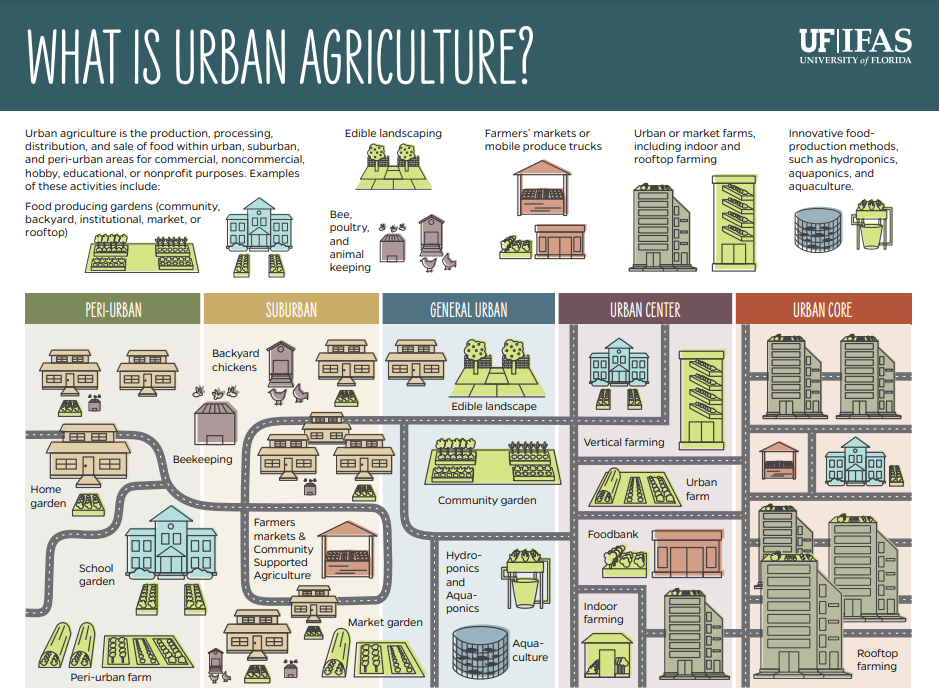
The global shift towards urbanisation— according to the United Nations (2018), by 2050, it’s expected that nearly 70% of the world’s population will live in cities—has made the need for sustainable urban farming more urgent than ever. These innovations offer solutions for growing food locally and allow urban communities to address key issues such as nutritional security, waste management, and environmental sustainability.
One of the most compelling reasons for adopting urban agriculture is its potential to reduce the environmental impact of food production. Traditional farming, particularly large-scale monoculture, can cause soil degradation, water pollution, greenhouse gas emissions, and pesticide resistance and can have a significant carbon footprint due to transportation, and energy consumption (Putra et al., 2020) . In contrast, urban farms can reduce food miles, use water more efficiently through technologies like hydroponics, and limit the need for chemical fertilisers and pesticides.
However, for these urban farming methods to thrive in the UK, there needs to be a system in place to ensure that they are not just innovative but also sustainable. For example, while vertical farming is often lauded for its efficiency and reduced land use, the high energy consumption required for artificial lighting and climate control can undermine claims of achieving net zero if this energy isn’t sourced from renewables. Without standards and benchmarks, it’s difficult for consumers, investors, and policymakers to seriously evaluate the environmental impact of these practices fairly and without fears of greenwashing. Sustainability benchmarking would provide the transparency and accountability needed to make informed decisions and encourage broader adoption of urban agri-tech solutions.
Drawing Inspiration from the Wine Industry’s Global Benchmark
The wine industry, though seemingly distant from urban agriculture, offers valuable insights for developing a sustainability benchmarking process for agri-tech. The Sustainable Wine Roundtable (SWR) has developed a Global Reference Framework (GRF) to help wineries worldwide evaluate and improve their sustainability practices, whereby according to Dr Peter Stanbury, research director at SWR “Through our framework, retailers will be able to say ‘this standard has reached a certain level of sustainability that has been benchmarked and assessed.”. This framework defines clear sustainability goals across key areas such as carbon footprint reduction, water management, biodiversity, and waste minimisation.
What makes the SWR’s GRF particularly effective is its ability to unify a fragmented industry. Before the framework, there were nearly 70 different sustainability certifications within the wine industry, each with its own standards and criteria. For both consumers and producers, this posed a significant challenge. The GRF consolidated these diverse standards into a global benchmark that simplifies sustainability while allowing for local adaptation.
In the context of urban agriculture and agri-tech in the UK, a similar benchmarking process could help bring clarity to the many different technologies and farming methods emerging in urban settings. Urban agri-tech is still a relatively new field, with various technologies, farming systems, and practices being tested across cities. A clear, standardised benchmark could help stakeholders understand the environmental impact of these practices and guide them toward more sustainable solutions.
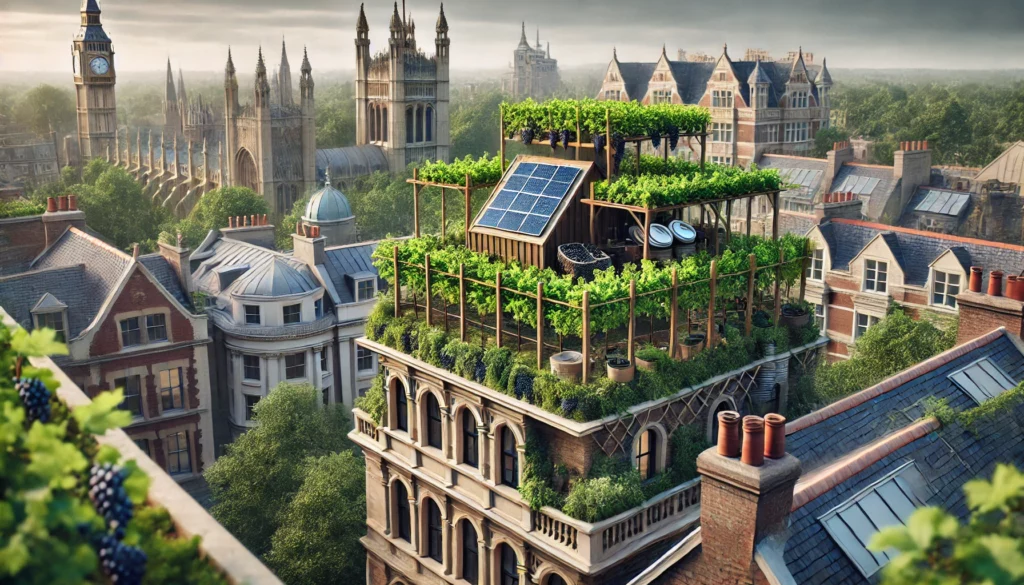
Key Areas for Urban Agri-Tech Benchmarking
To develop an effective benchmarking process for urban agri-tech, it’s essential to identify key areas of sustainability that align with the industry’s goals. These areas should cover environmental impacts, resource efficiency, and social responsibility. Drawing from the wine industry’s experience, here are several key areas that could form the basis of a sustainability benchmark for urban agriculture in the UK:
Resource Efficiency
Urban agriculture systems, particularly those that utilise technologies like hydroponics or vertical farming, are designed to be more resource-efficient than traditional farming. These systems can use up to 90% less water than conventional farming by recycling water and nutrients (Rafee et al., 2023). However, to ensure that these systems are genuinely sustainable, a benchmark could set standards for water and energy use, ensuring that urban farms are minimising their environmental impact and optimising their resource consumption for reasons other than profit.
A benchmark could specify efficiency targets for water use, energy use (particularly in relation to lighting, climate control, and water pumps), and land usage. Additionally, it could encourage innovations such as solar-powered urban farms or technologies that eliminate the need for synthetic fertilisers and pesticides.
Carbon Reduction
With the UK’s target to achieve net-zero carbon emissions by 2050, carbon reduction will be one of the key areas for benchmarking urban agriculture (HM Government, 2023). While urban farming systems typically use less energy for transportation (as they produce food closer to where it is consumed), other emissions sources such as energy consumption for lighting, heating, and climate control can still contribute to a farm’s overall carbon footprint.
A sustainability benchmark for urban agri-tech should track carbon emissions and encourage the use of low-carbon technologies. This could include requirements for renewable energy use, low-emission transportation, and strategies for carbon sequestration, such as soil regeneration or creating green spaces.
Biodiversity
Just as vineyards protect soil health and promote biodiversity in their landscapes, urban farms have the potential to improve biodiversity within cities. Urban farming can create green spaces that support pollinators, birds, and other wildlife, contributing to ecological health in urban environments (Nicholls, Ely, Birkin, Basu, & Goulson, 2020). By encouraging the use of native plants, biodiversity-rich systems, and sustainable soil practices, urban farms can act as mini-ecosystems that enhance urban biodiversity.
A sustainability benchmark could include criteria for integrating biodiversity into urban farming systems, such as requirements for habitat creation, soil health maintenance, and the use of organic or agroecological farming practices. It would also help encourage farms to go beyond just food production and consider their environmental and ecological footprint.
Waste Management
Waste management is another critical area for sustainability. Urban farms often have the opportunity to reuse and recycle waste in ways that traditional agriculture cannot. For example, waste products such as plant trimmings, food scraps, and organic matter can be composted to improve soil health or used as feedstock for biogas production.
A benchmarking framework could outline best practices for waste management, such as establishing composting systems, recycling water, or minimising packaging waste in commercialisation. It could also encourage a circular economy approach, where urban farms strive to minimise their waste output by turning it back into resources for the farm itself.
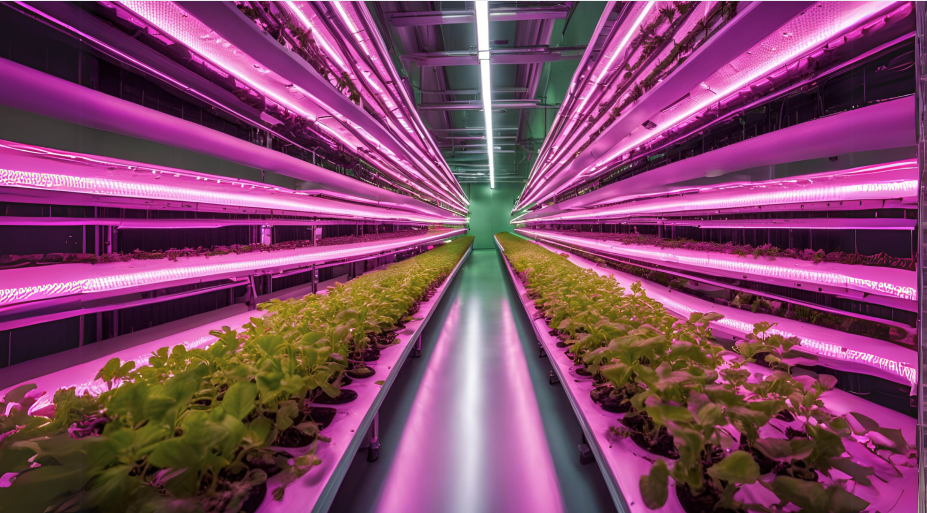
Collaborating with Industry Bodies and Initiatives
The development of a sustainability benchmark for urban agri-tech in the UK would require close collaboration between industry bodies, technology developers, government agencies, and sustainability advocates. As a pre-competitive space for the urban agri-tech sector, UKUAT works to foster innovation in the industry space, connecting organisations, academics, individuals, and industry leaders. The collective with other organisations like our own, could play a pivotal role in shaping a benchmark that works for the UK’s unique urban environments.
Additionally, aligning urban agri-tech standards with global frameworks, such as those developed by the European Commission (2024) and the United Nations’ Food Systems Summit (2021), would ensure that UK urban agriculture remains in step with international sustainability goals. The National Food Strategy, which advocates for a more resilient and sustainable food system, could also provide the policy backbone to support such initiatives.
The Role of Government and Policy
For any sustainability benchmark to succeed, it will require strong support from the UK government. Policymakers can encourage the development of such benchmarks through financial incentives, research grants, and collaborations with industry groups. This could include funding for urban farming research, pilot projects, or the development of technologies that meet sustainability criteria.
Government support could also ensure that urban agri-tech is incorporated into broader sustainability efforts. The UK’s 25-Year Environment Plan, which aims to enhance biodiversity, reduce waste, and improve environmental quality, could serve as a guiding document to align urban agri-tech practices with national sustainability goals (HM Government, 2018). The government could incentivise urban farms to adopt sustainable practices through tax breaks, grants, and other financial support.
Barriers to Government and Policy Change
While government involvement in setting sustainability benchmarks for urban agriculture has potential benefits, several challenges could slow down or complicate the process.
Complexity of Regulations
Urban farming is diverse, ranging from community rooftop gardens to high-tech vertical farms and hydroponics. There is no one-size-fits-all solution. Designing regulations that accommodate this variety while ensuring consistent sustainability standards is a complex task. Regulations need to be flexible yet effective across different farming methods.
Industry Resistance
While many successes in urban agri-tech come from an aspect of sustainability through innovation, not all organisations are involved in the industry with sustainability as their primary goal. Therefore, the Government may see that some industry players may resist standardised regulations, fearing increased costs or stifled innovation, which could hinder their ability to scale. New start-up organisations may also fail to meet the benchmark which would provide the business funding, effectively halting the importance of expanding urban agri-tech in the UK.
Bureaucratic Red Tape
Government processes can be slow, leading to missed opportunities for quick industry growth and the implementation of sustainable practices. There are often funding constraints that come along with this, with priorities for housing, food security and healthcare within the UK as a competing priority. Political changes may also shift priorities, affecting long-term support for urban agri-tech sustainability, and creating uncertainty for businesses. Therefore, generating an overall lack of funding needed to support the benchmarking programme.
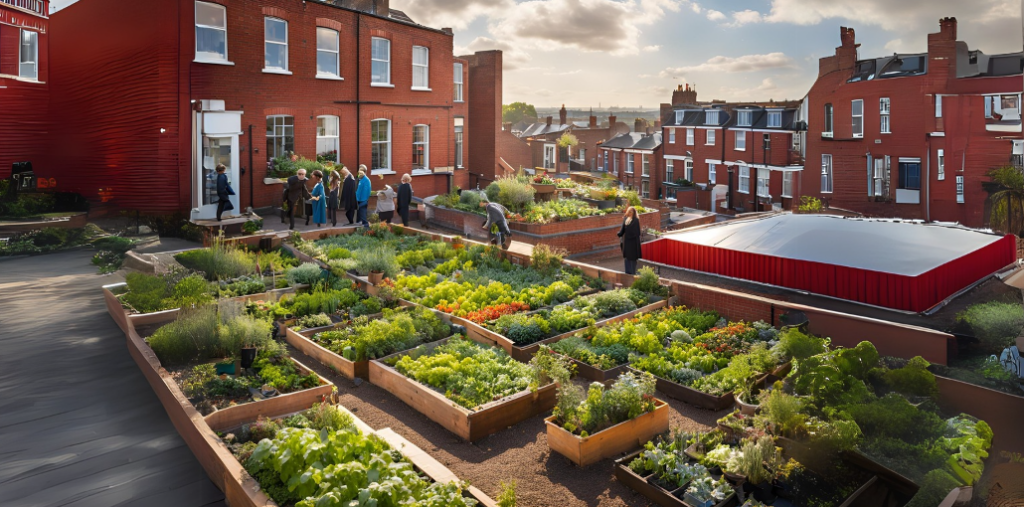
Conclusion: Towards a Greener, More Transparent Future
Urban agriculture and agri-tech are poised to revolutionise the UK’s food system. By providing a transparent, reliable sustainability benchmark, we can ensure that these innovations not only thrive but also contribute to a greener, more resilient future. Inspired by successful frameworks like the SWR’s GRF in the wine industry, the UK has an opportunity to establish a clear path forward for urban farming. Such a benchmark would provide farmers, growers, consumers, and policymakers with the tools they need to make informed, sustainable choices—creating a food system that benefits people, the environment, and future generations.
Urban agri-tech holds tremendous promise for the future of food, and with the right standards in place, we can ensure that it grows in a way that supports a truly sustainable future for the UK and beyond.
by Charlotte Yare, Membership and Communications Coordinator for UKUAT.

References
European Commission. (n.d.). EIP-AGRI funding opportunities. Retrieved November 17, 2024, from https://ec.europa.eu/eip/agriculture/sites/default/files/eip_agri_funding_for_web.pdf
Gilbert, J. (2024, November 1). Exclusive: SWR completes global sustainability benchmarking pilot. Harpers. Retrieved from https://harpers.co.uk/news/fullstory.php/aid/33424/Exclusive:_SWR_completes_global_sustainability_benchmarking_pilot.html
HM Government. (2018). A green future: Our 25 year plan to improve the environment. Retrieved November 17, 2024, from https://assets.publishing.service.gov.uk/media/5ab3a67840f0b65bb584297e/25-year-environment-plan.pdf
HM Government. (2023). Net zero government emissions roadmap. https://assets.publishing.service.gov.uk/media/6569cb331104cf000dfa7352/net-zero-government-emissions-roadmap.pdf
Nicholls, E., Ely, A., Birkin, L., Basu, P., & Goulson, D. (2020). The contribution of small-scale food production in urban areas to the sustainable development goals: A review and case study. Sustainability Science, 15(6), 1586. https://doi.org/10.1007/s11625-020-00852-x
Putra, R. P., Ranomahera, M. R. R., Rizaludin, M. S., Supriyanto, R., & Dewi, V. A. K. (2020). Investigating environmental impacts of long-term monoculture of sugarcane farming in Indonesia through DPSIR framework. Biodiversitas Journal of Biological Diversity, 21(10). https://doi.org/10.13057/biodiv/d211061
Rafee, B. M., Zaheed, S. M., Devi, Y. S., Asan, J., Jakith, A. A., Ahamed, R. S., … & Commerce, B. (2023). A rise of hydroponics: The future urban farming and sustainability of agriculture—An overview. Journal of Research Administration, 5(2), 8326.
United Nations. (2018). 68% of the world population projected to live in urban areas by 2050, says UN. Retrieved from https://www.un.org/uk/desa/68-world-population-projected-live-urban-areas-2050-says-un#:~:text=Today%2C%2055%25%20of%20the%20world’s,increase%20to%2068%25%20by%202050.
United Nations. (2021). Vision and principles of the food systems summit. Retrieved November 17, 2024, from https://www.un.org/en/food-systems-summit/vision-principles
European Commission. (n.d.). EIP-AGRI funding opportunities. Retrieved November 17, 2024, from https://ec.europa.eu/eip/agriculture/sites/default/files/eip_agri_funding_for_web.pdf
Gilbert, J. (2024, November 1). Exclusive: SWR completes global sustainability benchmarking pilot. Harpers. Retrieved from https://harpers.co.uk/news/fullstory.php/aid/33424/Exclusive:_SWR_completes_global_sustainability_benchmarking_pilot.html
HM Government. (2018). A green future: Our 25 year plan to improve the environment. Retrieved November 17, 2024, from https://assets.publishing.service.gov.uk/media/5ab3a67840f0b65bb584297e/25-year-environment-plan.pdf
HM Government. (2023). Net zero government emissions roadmap. https://assets.publishing.service.gov.uk/media/6569cb331104cf000dfa7352/net-zero-government-emissions-roadmap.pdf
Nicholls, E., Ely, A., Birkin, L., Basu, P., & Goulson, D. (2020). The contribution of small-scale food production in urban areas to the sustainable development goals: A review and case study. Sustainability Science, 15(6), 1586. https://doi.org/10.1007/s11625-020-00792-z
Putra, R. P., Ranomahera, M. R. R., Rizaludin, M. S., Supriyanto, R., & Dewi, V. A. K. (2020). Investigating environmental impacts of long-term monoculture of sugarcane farming in Indonesia through DPSIR framework. Biodiversitas Journal of Biological Diversity, 21(10). https://doi.org/10.13057/biodiv/d211061
Rafee, B. M., Zaheed, S. M., Devi, Y. S., Asan, J., Jakith, A. A., Ahamed, R. S., … & Commerce, B. (2023). A rise of hydroponics: The future urban farming and sustainability of agriculture—An overview. Journal of Research Administration, 5(2), 8326.
United Nations. (2018). 68% of the world population projected to live in urban areas by 2050, says UN. Retrieved from https://www.un.org/uk/desa/68-world-population-projected-live-urban-areas-2050-says-un#:~:text=Today%2C%2055%25%20of%20the%20world’s,increase%20to%2068%25%20by%202050.
United Nations. (2021). Vision and principles of the food systems summit. Retrieved November 17, 2024, from https://www.un.org/en/food-systems-summit/vision-principles
University of Florida, Institute of Food and Agricultural Sciences. (n.d.). What is urban agriculture? [Infographic]. Retrieved from https://programs.ifas.ufl.edu/media/programsifasufledu/-urban-agriculture-and-community-food-systems/docs/MFREC_WhatIsUrbanAgricultureInfographic_Final.pdf


